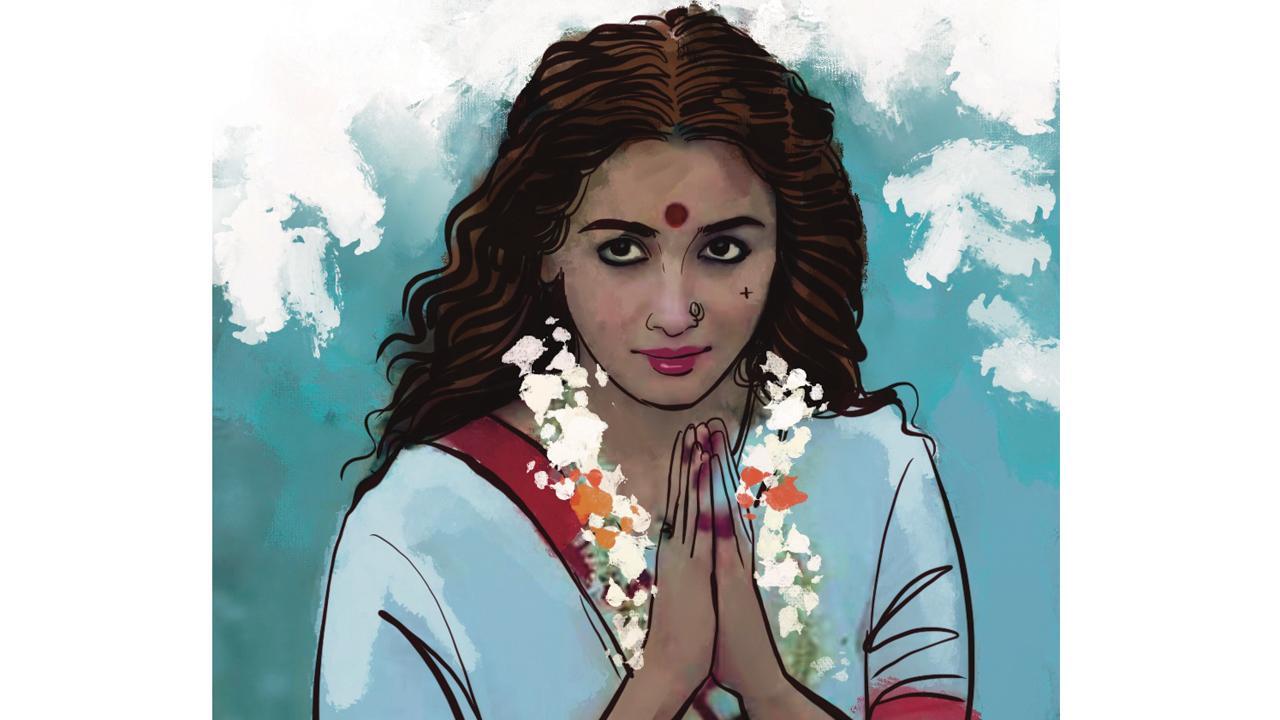The film bravely takes multiple risks, by having a heroine-led film in conservative Bollywood, and by releasing theatrically worldwide at this time, rather than OTT

Illustration/Uday Mohite
![]() Sanjay Leela Bhansali’s Gangubai Kathiawadi is a feisty, feminist biopic of the real-life Gangubai, a sex worker who ruled Kamathipura, Bombay’s red light district, in the 1950s and ’60s. Starring Alia Bhatt, it had its world premiere in the Berlin Film Festival’s Berlinale Special Gala last week. It is Bhansali’s second film at the Berlinale, after Hum Dil De Chuke Sanam in 2000. And it is Alia Bhatt’s third film in the Berlinale, after Highway (2014) and Gully Boy (2019). The film opens in cinemas worldwide on February 25. The film bravely takes multiple risks, by having a heroine-led film in conservative Bollywood, and by releasing theatrically worldwide at this time, rather than OTT.
Sanjay Leela Bhansali’s Gangubai Kathiawadi is a feisty, feminist biopic of the real-life Gangubai, a sex worker who ruled Kamathipura, Bombay’s red light district, in the 1950s and ’60s. Starring Alia Bhatt, it had its world premiere in the Berlin Film Festival’s Berlinale Special Gala last week. It is Bhansali’s second film at the Berlinale, after Hum Dil De Chuke Sanam in 2000. And it is Alia Bhatt’s third film in the Berlinale, after Highway (2014) and Gully Boy (2019). The film opens in cinemas worldwide on February 25. The film bravely takes multiple risks, by having a heroine-led film in conservative Bollywood, and by releasing theatrically worldwide at this time, rather than OTT.
ADVERTISEMENT
Bhansali has had strong women characters earlier, including in Devdas, Black, Ram Leela, Bajirao Mastani, Padmaavat, and now Gangubai Kathiawadi. Gangubai elopes from Kathiawar with her husband, to become a film star in Bombay, but he sells her to a brothel in Kamathipura. She fights back, becomes a brothel madam, and transforms into the matriarch of Kamathipura, who fights for sex workers’ rights. The film is based on the non-fiction book Mafia Queens of Mumbai, by S Hussain Zaidi and Jane Borges of mid-day. Bhansali told me he grew up one lane away from Kamathipura and lived there for 30 years.
The heroine’s name, Ganga, the holy river, immediately harks back to Ram Teri Ganga Maili, of a woman sullied. But Bhansali’s film pushes all the right buttons, totally rooting for a feminist character, while remaining greatly entertaining. Certainly a film to be relished on the big screen. The film celebrates a colourful character with financial, mafia and political clout. She made a famous speech in Azad Maidan, Mumbai, demanding the legalisation of prostitution, and even met the prime minister Pandit Jawaharlal Nehru, and successfully stayed the sex workers’ eviction. She also fought for girls’ education, and single womens’ rights.
Bhansali’s direction and craftsmanship are assured. He is the director, screenwriter (with Utkarshini Vashishtha), editor, producer and music composer—a rare distinction. He makes feminism fun, with songs and dances and seeti-bajaoing dialoguebaazi. Alia Bhatt ably carries the film on her shoulders. Though young and slightly built, she absorbs macho traits to suggest power through body language and voice; she loves alcohol and beedis, slaps and kicks people, and swaggers around in a Bentley. She also draws from deep emotional reserves.
The screenplay, by Bhansali and Vashishtha (her debut screenplay), is packed with moments. While Gangubai rises to power—her rise is shown as relatively easy in the film—it is careful not to paint her as a saint. Her turning point came after she was brutally raped, and asked real life mafia don Karim Lala (Rahim Lala) for protection, and he publicly declared her his ‘rakhi brother.’ After that, clout with the mafia, police, mantri-ministers follows swiftly. She betrays someone close, deviously turning it into political capital during the local elections; she too exploits the girls as a brothel madam, as she once was.
Courageously, in today’s right-wing atmosphere, Bhansali underlines a secular ethos he celebrated earlier in Bajirao Mastani: not only does a Muslim don (a dignified Ajay Devgn in a generous guest appearance) give a Hindu woman protection (it’s in the book), but he also celebrates a Hindu-Muslim romance, and includes a feminist journalist Fezi (Jim Sarbh; Muslim? Parsi?). The film honours the marginalised; not only a sex worker, but also a transgender (Vijay Raaz, superb) stand for elections, suggesting a robust local democracy. There are delicious dialogues, written by Prakash Kapadia and Vashishtha. When a school principal demands the father’s name for admission for the girls, Gangubai retorts, “Maa ka naam kafi nahin hai?” (Isn’t the mother’s name good enough?”) adding, “Chalo, baap ka naam Dev Anand.” (Okay, write Dev Anand). Shantanu Maheshwari as her diffident lover Afsan, Indira Tiwari as the sex worker Kamli and Seema Pahwa as the brothel madam, do well.
Bhansali’s songs are evocative (with Sanchit Balhara and Ankit Balhara’s background score), and include the lovely qawwali Shikayat—qawwalis, once the staple of mainstream cinema and Muslim socials, are now nearly erased from Bollywood—and there are catchy dances like Dholida. Sudeep Chatterjee’s cinematography is compelling, as usual. The editing is brisk for a 152 min film. The sound and production design are meticulous: more sombre than Bhansali’s usually extravagant worlds, the sets deliciously also tribute old cinemas like Alfred and New Roshan Talkies. Key women talent include co-producer Prerna Singh, and screenplay and dialogues by Utkarshini Vashishtha. Produced by Bhansali Productions and Jayantilal Gada’s Pen Movies, the film is distributed internationally by Viacom18 Studios and Paramount Pictures International. Kisise darneka nahin (Never fear anyone), as Gangubai says. Like, totally.
Meenakshi Shedde is India and South Asia Delegate to the Berlin International Film Festival, National Award-winning critic, curator to festivals worldwide and journalist.
Reach her at [email protected]
 Subscribe today by clicking the link and stay updated with the latest news!" Click here!
Subscribe today by clicking the link and stay updated with the latest news!" Click here!







